The first horror movies in recorded history, “House of the Devil,” “A Terrible Night” and “A Nightmare” were made in 1896 by Georges Méliès and ranged from just over a minute to just over three minutes long.
While maybe not the most popular genre at the time, it has since grown in popularity, with films like “The Exorcist,” “Carrie,” “Nightmare on Elm Street,” “It,” “The Thing,” “Silence of the Lambs” and many others garnering critical acclaim, the last of which earning Academy Award wins for its lead actor and actress.
While these movies are often seen as disturbing, what makes some horror movies even more uncomfortable to watch is knowing they are based on, or inspired by, a true story.
Here are some horror movies based on, or inspired partly, by true stories.
“Zodiac” (2007)
Jake Gyllenhaal starred in 2007’s “Zodiac” in which he played a reporter trying to uncover who the Zodiac Killer is.
(Photo credit should read FRANCOIS GUILLOT/AFP via Getty Images)
Jake Gyllenhaal stars as a reporter investigating a series of murders in San Francisco between 1968 and 1969. The movie is filled with chilling scenes, mostly due to the fact that the identity of the killer is unknown, and every character is at-risk throughout the entirety of the film.
The movie is based off the murders committed by the Zodiac Killer and was made using two books “Zodiac” and “Zodiac Unmasked” written by Robert Graysmith, the character Gyllenhaal plays in the movie. David Fincher’s “Zodiac” is often praised by law enforcement, reporters and the public for how accurate it was in its telling of the tale.
The serial killer would tease authorities by sending them coded messages via newspaper articles. These letters remained a mystery for many years, but in 2021, his final two notes were decoded and revealed he was killing people in order to build an army of slaves for his afterlife.
Just like in the film, the killer’s preferred method used to carry out the killings was not always the same, and he didn’t have consistent modus operandi. He got the moniker of Zodiac Killer because that is how he would sign the letters he wrote to the newspapers.
There were not many suspects at the time, and the movie primarily focused on one, Arthur Leigh Allen, who seemed a likely candidate. He died in 1992, and 10 years later it was revealed his DNA did not match those found on envelopes the killer sent newspapers. Other suspects included Joseph “Giuseppe” Bevilacqua, Gary Francis Poste and Richard Gaikowski, but the killer’s identity is still unknown.
“The Amityville Horror” (1979)
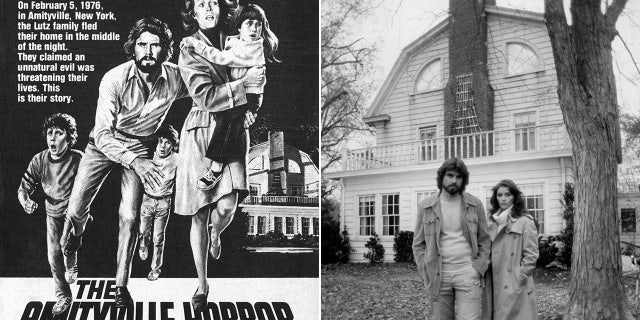
After a horrendous mass murder took place in a house in Amityville, New York, a new family moved in and complained of paranormal activity, inspiring the movie, “The Amityville Horror.”
(Getty Images)
The 1979 paranormal horror movie is based off a real house in which a horrendous crime took place, followed by some very confusing paranormal activity. The real crime took place five years prior to the movie’s release in 1974 in a house in a small Long Island town Amityville.
In November 1974, 23-year-old Ronald J. DeFeo Jr. killed his entire family, including his parents and four siblings while they were asleep in their beds. He was caught and was convicted of six sentences of 25 years to life to be served at Sullivan Correctional Facility in the town of Fallsburg, New York, where he stayed until his death in March 2021 at Albany Medical Center.
According to Biography.com, just as in the movie, a new family moved into the home where the murders took place, only a year after the killings. The Lutz family only lived there for 28 days however, due to experiencing a number of paranormal horrors in the house. The family claimed to have smelled strange smells, sensed cold spots in certain areas of the house and saw green slime coming out of the walls.
Patriarch George Lutz claimed to have woken up every night at 3:15 a.m., which was when the murders were said to have been committed, and when a priest came over to cleanse the house, he claimed to have heard a spirit yelling at him to get out. The family also claimed they saw the matriarch, Kathy, levitating and a pig-like creature with red eyes staring straight through a window at George and his son.
There are rumors that the family made up these stories to earn money, as they were going through financial hardships at the time. However, when given a lie detector test to give credibility to the claims, both Kathy and George passed.
“The Conjuring” (2013)
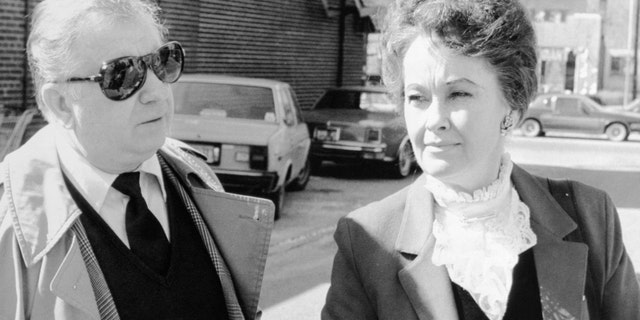
The 2013 film, “The Conjuring” is based off the work of demon hunters Ed and Lorraine Warren.
(Getty Images)
When “The Conjuring” was released in 2013, it was easy for audiences to pass it off as yet another horror story based in fiction, but what they did not know is that it was based off a real family, and the demon hunting husband and wife duo who helped them. The female hunter, Lorraine Warren, acted as a consultant on the film, making sure nothing was overdramatized more than it needed to be.
The Perron family reportedly moved into a farmhouse in Rhode Island in 1971 and quickly began seeing spirits in the home. They later learned the family who owned the home prior to them owned it for eight generations, and many of them died mysterious deaths in or around the home. Like in the film, the worst of these demons was called Bathsheba.
DID ‘THE CONJURING’ COUPLE HIDE CREEPY, REAL-LIFE AFFAIR BETWEEN DEMONOLOGIST AND UNDERAGE GIRL?
According to Andrea Perron, one of the daughters living in the home, they believed Bathsheba was the one haunting them because she thought of herself as the woman of the house and did not like that the Perron family mother was trying to take her place. The Warrens – Lorraine and her husband Ed – were asked to come to the house often to investigate, and during one visit Lorraine conducted a séance, during which the matriarch of the Perron family, Carolyn became possessed and started speaking in tongues.
After the séance, the Warrens were kicked out and asked not to return to the home. The family continued to live there until 1980 when they were able to afford to move out and at that point, the haunting had stopped.
“When the word gets out that it’s really about the love of family and people who come to help, and God is at the center of it, you’ll understand that these events do happen. That’s why we put the Ed Warren quote in there,” screenwriter Chad Carey told CBN. “He just wished everyone had the faith they had, and then he wouldn’t have to do any of this. So, it was just really one of those opportunities for us to try to put forth a very straightforward, God-based theme movie and take advantage of the fact that we didn’t have to hide the religion.”
“Poltergeist” (1982)
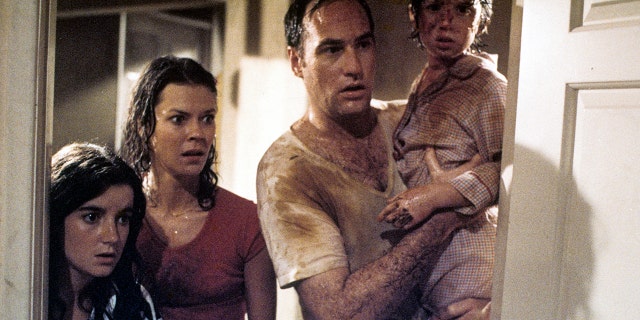
The movie “Poltergeist” is inspired by the events that took place in the Herrman House in 1958.
(Photo by Metro-Goldwyn-Mayer/Getty Images)
When “Poltergeist” came out in 1982, it had everyone on the edge of their seats wondering if the family was going to be okay and if five-year-old Carol Ann was going to be found. It had families everywhere afraid something supernatural was talking to their children through the TV screen.
The movie is inspired by, and loosely based on the story of the Herrmann House, and everything that happened to the family who lived there in 1958. In February 1958, James Herrmann got a call from his wife Lucille telling him she heard popping sounds coming from different rooms and found uncorked bottles in those rooms. James initially dismissed her claims, until it happened three more times, and he saw bottles moving in his bathroom without anyone touching them.
Unlike in the film, the house is reportedly not the traditional haunted house, as it is not built on ancient burial grounds or has a long history of inhabitants. The house was brand new and the Herrmanns were the first to live there. Parapsychologist Dr. J.B. Rhine hypothesized the presence of the teenage kids is what was drawing the poltergeist to the house.
Dr. Rhine and his colleagues came to the house to investigate, and shortly after they left, the haunting stopped. In total, there were 70 reported instances in one month.
Steven Spielberg took this family’s story and added many more dramatic details to the plot, such as the kidnapping of Carol Ann and the pool full of skeletons. It is said that the set of the movie itself was haunted, as its stars Dominique Dunne and Heather O’Rourke both died at very young ages, and there were reportedly a lot of weird stuff that happened on set.
“In ‘Poltergeist,’ I wanted to terrify, and I also wanted to amuse — I tried to mix the laughs and screams together,” Spielberg told The New York Times in 1982. “‘Poltergeist’ is the darker side of my nature — it’s me when I was scaring my younger sisters half to death when we were growing up.”
“Annabelle” (2014)
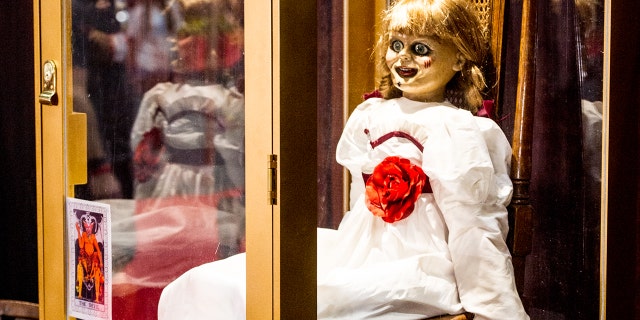
The movie “Annabelle” is inspired by another case the Warrens investigated involving a possessed doll.
(Photo by Ollie Millington/Getty Images)
The movie “Annabelle” acts as a prequel to “The Conjuring” films and follows the case of the real life doll which is believed to be possessed. While Lorraine Warren was able to give her input during the making of “The Conjuring,” she was not able to do so for “Annabelle.”
In 1970, a nurse was given a Raggedy Anne doll as a gift from her mother, and soon after began to notice there was something strange about the doll. She claims that she and her roommate began to notice the doll moving without them having moved it, and found notes that said “help me, help us” on parchment paper when they had no parchment paper in the home.
‘ANNABELLE’ REVEALS ‘THE CONJURING’S TERRIFYING BACKSTORY
As reported by The New Haven Register, after an incident in which a male friend woke up to find the doll staring at him, feeling as if he was being choked and with scratch marks on his body, they decided to call in a professional medium to hold a séance. During the séance, they learned the doll had been possessed by a 7-year-old girl named Annabelle who passed away in the property that used to be there before the apartment building was built.
The Warrens got involved and deduced that rather than being content possessing the doll, Annabelle was looking for a new human host, and therefore, took the doll and locked it in a glass case where it currently resides at the Warrens’ now-defunct Occult Museum.
In the movie, the doll is owned by a young couple who are expecting. When the woman reaches the end of her pregnancy she is stabbed in the stomach by a satanic cult. The blood of one of the satanists, aptly named Annabelle Higgins, lands on the doll, who then starts acting as if it is possessed.
When working on the sequel “Annabelle Comes Home,” writer Gary Dauberman spoke with Ed and Lorraine Warren’s daughter Judy Warren to get a better understanding of the couple.
“I wanted to ask about the things that I couldn’t find out in the countless books that have been written on them and by them,” Dauberman said. “The movie takes place in their house, which hopefully becomes its own kind of character. You set a horror movie in the Warren house, there’s a lot you could do [but] it has its own sort of challenges and limitations too.”
“The Texas Chain Saw Massacre” (1974)
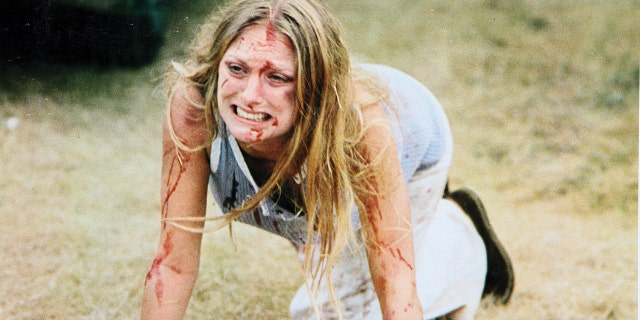
“The Texas Chain Saw Massacre” is inspired by the crimes of Ed Gein.
(Photo by LMPC via Getty Images)
The 1974 horror film “The Texas Chain Saw Massacre” follows a group of five friends as they pick up a hitchhiker on the way back from visiting the graveyard, only for him to come back and hunt them down with various weapons, including a chainsaw. This story was inspired in part by a real killer, Ed Gein.
The police reportedly found the human remains of 10 women in Gein’s home in 1957, however, he had only killed two of them. He claimed he got the other eight after digging up the graves of women who reminded him of his mother, who passed away in 1945. Gein was incredibly close to his mother and was devastated when she died.
Unlike in the film, Gein did not use a chainsaw as his weapon of choice, as both his victims were shot to death with a pistol. The killer in the film wore a mask made of human skin due to a skin condition, but in real life, Gein was hoping to create a “woman suit” in an effort to replace his mom, according to Decider.
“I definitely studied Gein, but I also noticed a murder case in Houston at the time, a serial murderer you probably remember named Elmer Wayne Henley. He was a young man who recruited victims for an older homosexual man,” co-screenwriter Kim Henkel explained to Texas Monthly.
Gein’s crimes also inspired Alfred Hitchcock’s thriller “Psycho” and the character of Buffalo Bill from “Silence of the Lambs.”
“The Exorcist” (1973)
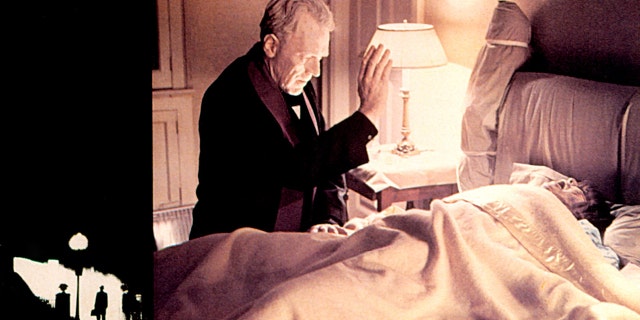
“The Exorcist” is loosely based off the 1949 exorcism of Robbie Doe.
(Photo by LMPC via Getty Images)
In 1973, audiences were introduced to “The Exorcist,” which tells the story of a young girl and the process to release the demon possessing her. The film is based off a 1971 book written by William Blatty, who was inspired to write the book after learning about the story of Roland Doe in 1949. Blatty also wrote the screenplay for the movie.
Fourteen-year-old Doe asked his aunt for a Ouji Board for his birthday, and after she died, he began to experience unexplainable things around the house, like rattlings on the walls, strange noises, and flying objects, something the movie also portrays. According to Screen Rant, after trying multiple different outlets, his family asked a priest to perform an exorcism. His first attempt was cut short after Doe began throwing things at the priest.
The family then traveled to Saint Louis University – after the word “louis” appeared on Doe’s body — where two other priests performed exorcisms on him. It is unknown what happened after this point, but many believe the boy is actually Ronald Hunkeler, who grew up to be a NASA engineer who worked on the moon landing.
Some details are changed in the film. In the film, the possessed child is a 12-year-old girl living with a single mother who started experiencing violent outbursts, which Doe was never confirmed to have. They also altered the words that appeared on her body, to “help me” instead of “louis” to avoid moving the setting of the movie to St. Louis.
“Scream” (1996)
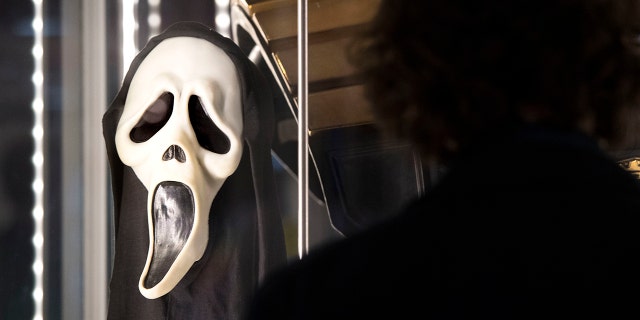
“Scream” is inspired by a series of murders in Gainesville, Florida which resulted in the death of five people.
In 1996, the first of six Scream movies was released, and fans first saw the iconic Ghostface mask, which remains a Halloween costume staple to this day. Many fans of the film remember the opening scene when Drew Barrymore is mercilessly being stalked through phone calls while home alone at night, only to be stabbed by Ghostface.
Something some fans may not know is the original movie is inspired by a series of murders in Gainesville, Florida, taking place over the course of three nights, resulting in the deaths of Sonja Larson, Christine Powell, Christa Hoyt, Tracy Paules and Manny Toboada. All the victims were stabbed and positioned in a very specific way.
As reported by Complex and The Independent just a few days after the last murders, Gainesville police identified Edward Lee Humphrey as their primary suspect. He had connections with some of the victims, a documented history of violence and was looked at as “a very good suspect.” However, a few months later, in January 1991, another more likely suspect emerged, Danny Rolling.
Rolling had been arrested a few times, mostly for theft, but ended up having to flee his hometown in Louisiana after he shot his father twice in the head. What made him even more of a suspect was the fact that he was wanted for the murder of a family in Shreveport who had all been stabbed and staged in the same way the Gainesville victims were positioned. There was no trial in this case, as Rolling pleaded guilty on the first day of trial.
CLICK HERE TO SIGN UP FOR THE ENTERTAINMENT NEWSLETTER
When screenwriter Kevin Williamson saw a special about the Gainesville Murders on TV while he was home alone one night, he began to fear that a murderer was waiting for him outside the house. This inspired him to write the screenplay for “Scream” and sell it to a production company, thus creating many folks’ favorite scary movie.
“I was house-sitting for a friend of mine and I walk into the family room and I see that the window’s open, and I’m freaked out,” Williamson told The Independent. “So I go, and I get a butcher knife and I start walking around the house and I call up my friend on the phone and [say] ‘I think someone’s in the house.’”
“The Birds” (1963)
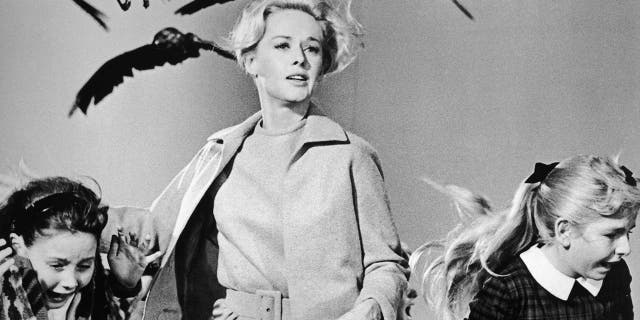
American actor Tippi Hedren and a group of children run away from the attacking crows in a still from the film ‘The Birds’ directed by Alfred Hitchcock.
(Photo by Universal Studios/Getty Images)
The plot for Alfred Hitchcock’s “The Birds” is a strange concept for a horror movie. It revolves around a town being terrorized by birds who are not only killing their animals, but also their loved ones.
According to Popsci, Hitchcock got the idea for this bizarre horror movie after an actual town in California was attacked by birds. In 1961, residents of Capitola, California woke up to find birds crashing into their homes and cars and throwing up half digested food onto wherever they landed.
CLICK HERE TO GET THE FOX NEWS APP
They didn’t know it at the time, but the reason for the bird’s unusual behavior was poisoning from toxic algae they had eaten.